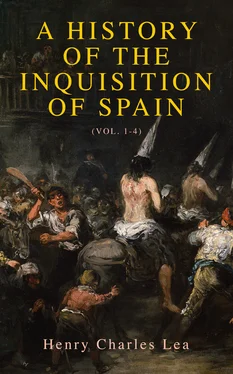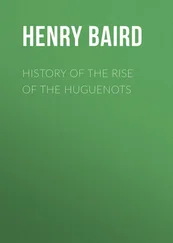INFLUENCE OF THE CHURCH
More serious was the effect upon the Jews of the spirit awakened at Vienne. That council, besides enacting very severe laws against usury, denounced the privilege accorded in Spain to Jews, whereby Jewish witnesses were requisite for the conviction of Jewish defendants. It did not presume to annul this privilege, but forbade all intercourse between the races wherever it was in force.[216] The Spanish prelates, in returning from the council in 1312, brought with them these canons and the spirit of intolerance that dictated them and made haste to give expression to it at the council of Zamora, in January, 1313, in a number of canons, the temper of which is so different from the previous utterances of the Spanish Church that it shows the revolution wrought in their mode of thinking by intercourse with their brethren from other lands. Henceforth, in this respect, the Spanish Church emerges from its isolation and distinguishes itself by even greater ferocity than that which disgraced the rest of Christendom. The fathers of Zamora invoked the curse of God and of St. Peter on all who should endeavor to enforce the existing laws requiring the evidence of Jews to convict Jews. They denounced the Jews as serpents, who were only to be endured by Christians because they were human beings, but were to be kept in strict subjection and servitude, and they sought to reduce this principle to practice by a series of canons restricting the Jews in every way and putting an end to all social intercourse between them and Christians.[217] The friendly mingling of the races, which shows how little the prejudices of the churchmen were shared by the people at this period, became a favorite subject of objurgation and required a long series of efforts to eradicate, but the Church triumphed at last, and the seeds of envy, hatred and all uncharitableness, which it so assiduously planted and cultivated, yielded in the end an abundant harvest of evil. What prepossessions of Christian kindness the prelates of Zamora felt that they had to overcome are indicated in the final command that these constitutions should be read publicly in all churches annually, and that the bishops should compel by excommunication all secular magistrates to enforce them.[218]
The Spanish Church, thus fairly started in this deplorable direction, pursued its course with characteristic energy. In 1322 the utterances of the council of Valladolid reveal how intimate were the customary relations between Christian and infidel, and how the Church, in place of taking advantage of this, labored to keep the races asunder. The council recites that scandals arise and churches are profaned by the prevailing custom of Moors and Jews attending divine service, wherefore they are to be expelled before the ceremonies of the mass begin, and all who endeavor to prevent it are to be excommunicated. The habit of nocturnal devotional vigils in churches is also said, probably with truth, to be the source of much evil, and all who bring Moors and Jews to take part with their voices and instruments are to be expelled. To preserve the faithful from pollution by Moorish and Jewish superstitions, they are commanded no more to frequent the weddings and funerals of the infidels. The absurd and irrational abuse whereby Jews and Moors are placed in office over Christians is to be extirpated, and all prelates shall punish it with excommunication. As the malice of Moors and Jews leads them craftily to put Christians to death, under pretext of curing them by medicine and surgery and, as the canons forbid Christians from employing them as physicians, and as these canons are not observed in consequence of the negligence of the prelates, the latter are ordered to enforce them strictly with the free use of excommunication.[219]
INFLUENCE OF THE CHURCH
These last two clauses point to matters which had long been special grievances of the faithful and which demand a moment’s attention. The superior administrative abilities of the Jews caused them to be constantly sought for executive positions, to the scandal of all good Christians. We have seen that under the Goths it was an abuse calling for constant animadversion. It was one of the leading complaints of Innocent III against Raymond VI of Toulouse, which he expiated so cruelly in the Albigensian crusades, and one of the decrees of the Lateran council was directed against its continuance.[220] In Spain the sovereigns could not do without them, and we shall have occasion to see that it became one of the main causes of popular dislike of the unfortunate race, for the Christian found it hard to bear with equanimity the domination of the Jew, especially in his ordinary character of almojarife , or tax-collector. As early as 1118, Alfonso VIII, in the fuero granted to Toledo, promised that no Jew or recent convert should be placed over the Christians; Alfonso X made the same concession in the fuero of Alicante, in 1252, except that he reserved the office of almojarife, and in the Partidas he endeavored to make the rule general.[221] The same necessity made itself felt with regard to the function of the physician, for which, during the dark ages, the learning of Jew and Saracen rendered them almost exclusively fitted. Zedechias, the Jewish physician of the Emperor Charles the Bald, was renowned, and tradition handed down his name as that of a skilful magician.[222] Prince and prelate alike sought comfort in their curative ministrations, and, as the Church looked askance on the practice of medicine and surgery by ecclesiastics, unless it were through prayer and exorcism, they had the field almost to themselves. This had always been regarded with disfavor by the Church. As early as 706 the council of Constantinople had ordered the faithful not to take medicine from a Jew, and this command had been incorporated in the canon law.[223] Another rule, adopted from the Lateran council of 1216, was that the first duty of a physician was to care for the soul of the patient rather than for his body, and to see that he was provided with a confessor—a duty which the infidel could scarce be expected to recognize.[224] It is therefore easy to understand why the general abhorrence of the Church for Moor and Jew should be sharpened with peculiar acerbity in regard to their functions as physicians; why the council of Valladolid should endeavor to alarm the people with the assertion that they utilized the position to slay the faithful, and the council of Salamanca, in 1335, should renew the sentence of excommunication on all who should employ them in sickness.[225] Nominally the Church carried its point, and in the prescriptive laws of 1412 there was embodied a provision imposing a fine of three hundred maravedís on any Moor or Jew who should visit a Christian in sickness or administer medicine to him,[226] but the prohibition was impossible of enforcement. About 1462, the Franciscan, Alonso de Espina, bitterly complains that there is not a noble or a prelate but keeps a Jewish devil as a physician, although the zeal of the Jews in studying medicine is simply to obtain an opportunity of exercising their malignity upon Christians; for one whom they cure they slay fifty, and when they are gathered together they boast as to which has caused the most deaths, for their law commands them to spoil and slay the faithful.[227] It was but a few years after this that Abiatar Aben Crescas, chief physician of Juan II of Aragon, the father of Ferdinand, vindicated Jewish science by successfully relieving his royal patient of a double cataract and restoring his sight. On September 11, 1469, pronouncing the aspect of the stars to be favorable, he operated on the right eye; the king, delighted with his recovered vision, ordered him to proceed with the left, but Abiatar refused, alleging that the stars had become unfavorable, and it was not until October 12 that he consented to complete the cure.[228] The friars themselves believed as little as royalty in the stories which they invented to frighten the people and create abhorrence of Jewish physicians. In spite of the fact that Ferdinand and Isabella, in the Ordenanzas of 1480, repeated the prohibition of their attending Christians, the Dominicans, in 1489, obtained from Innocent IV permission to employ them, notwithstanding all ecclesiastical censures, the reason alleged being that in Spain there were few others.[229]
Читать дальше












